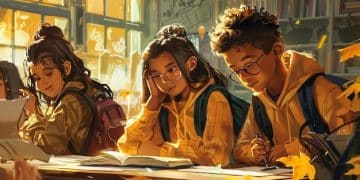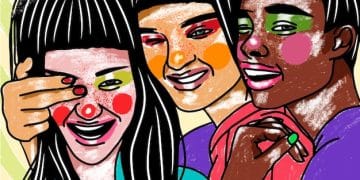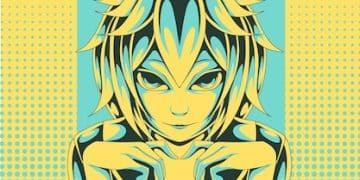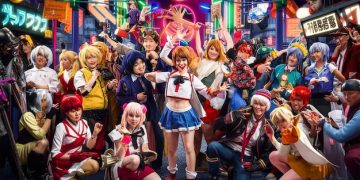Emotional Shonen Manga: Beyond Fights and Power-Ups
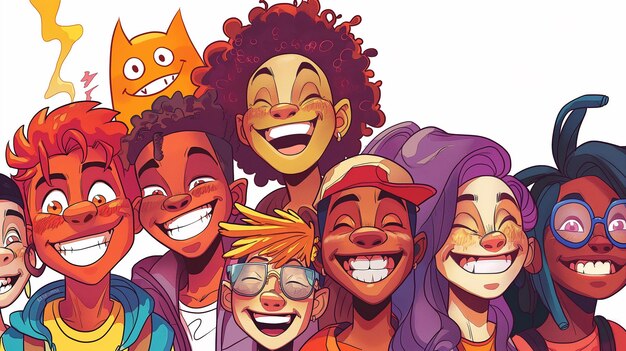
Beyond the Battles: Exploring the Emotional Depth in Modern Shonen Manga delves into the nuanced character development and intricate emotional narratives present in contemporary shonen manga, highlighting the genre’s evolution beyond traditional action tropes.
Beyond the Battles: Exploring the Emotional Depth in Modern Shonen Manga reveals how contemporary creators are enriching the genre with complex character arcs and nuanced emotional storytelling that resonates deeply with audiences. This article examines how these stories transcend traditional action tropes, providing compelling narratives that focus on growth, relationships, and inner conflicts.
Unveiling the New Era of Shonen Manga
Shonen manga has long been synonymous with epic battles and power-ups, but a new era is dawning. Modern shonen series are increasingly focusing on emotional depth, character development, and intricate storytelling, which captivates a wider audience.
This evolution allows creators to explore themes of identity, friendship, loss, and redemption, enriching the narrative landscape and creating stories that resonate beyond the fighting arenas. Let’s delve into the ways shonen manga is achieving this shift.
The Shift from Simple to Complex Characters
Traditional shonen protagonists often start as archetypes, but modern stories invest more in their backgrounds and personal struggles.
These characters not only battle external foes but also their own internal demons, offering audiences relatable experiences and profound insights.
Examples of Emotionally Rich Shonen Manga
Series like “Attack on Titan” and “Vinland Saga” exemplify this trend, challenging conventional narratives with darker themes and morally ambiguous characters.
- “Attack on Titan”: Explores themes of freedom, oppression, and the high cost of war, pushing characters to make agonizing choices.
- “Vinland Saga”: Focuses on personal redemption and explores themes of revenge and the futility of violence.
- “Your Lie in April”: This series combines music and drama to explore themes of grief, healing, and the transformative power of art.
Many modern shonen anime series have gone beyond generic archetypes to present a protagonist that faces realistic struggles, which makes the audience sympathize and connect with the character even deeper.
As shonen manga continues to evolve, these new directions promise richer and more impactful stories that resonate with audiences of all ages.
The Power of Friendship and Bonds
Friendship has always been a cornerstone of shonen manga, but the depth and complexity of these relationships are now more pronounced. Modern stories portray friendships as vital to overcoming personal and collective challenges.
These bonds provide emotional support, drive character development, and often serve as the catalyst for significant plot events. They evolve beyond being mere plot devices into genuine sources of support and growth.
Exploring the Nuances of Friendship
Many series delve into the difficulties and conflicts within friendships, showcasing realistic dynamics more relatable than idealized portrayals.
This creates a range of compelling scenarios, with characters helping each other through personal problems and even overcoming ideological differences to maintain their relationships.
Examples of Profound Friendship in Shonen Manga
Series like “Haikyu!!” and “Assassination Classroom” showcase the importance of teamwork, trust, and mutual respect.
- “Haikyu!!”: Demonstrates how dedication and collaborative spirit enable individual growth and collective success.
- “Assassination Classroom”: Explores the powerful bonds that can form under extreme circumstances, emphasizing the impact of mentorship and support.
- “Jujutsu Kaisen”: Explores how a group of friends come together to support, protect, and understand each other in the face of adversity. Also showing how loss and grief can push those same friends to make hard decisions for the better good.
These storylines demonstrate that the bonds characters form with each other are about more than just camaraderie and support. The shared experiences and the trust they place among each other is essential for personal growth and their ability to overcome challenges.
Addressing Loss and Grief in Shonen Manga
Loss is a universal human experience, and shonen manga is increasingly incorporating it into its narratives. By exploring the emotional impact of death and sacrifice, these series add depth and realism.
The depiction of grief allows characters to grapple with their vulnerabilities and discover inner resilience, transforming them and shaping their actions and goals.
The Realistic Portrayal of Grief
Rather than brushing over these moments, many modern series dedicate significant screen time to the grieving process, letting characters express their pain in relatable ways.
This realism enables audiences to connect with the characters and their struggles on a deeper emotional level.
Examples of Dealing with Loss in Shonen Manga
“Demon Slayer” and “Erased” are poignant examples, where characters must confront past traumas and learn to move forward.
- “Demon Slayer”: Highlights resilience and determination in the face of tragic losses, as Tanjiro seeks to cure his sister.
- “Erased”: Follows Satoru’s journey to prevent a childhood tragedy, illustrating the lasting impact of trauma and the importance of closure.
- “Fullmetal Alchemist”: The Elric brothers experience a devastating loss, and decide to do whatever it takes to reverse what happened, showcasing how sacrifice and grief can turn into determination to change the outcome.
Showing how characters deal with loss adds emotional depth to the storyline and provides meaningful insights into the human condition, allowing audiences to connect with the characters on a deeper level.
The Exploration of Morality and Justice
Shonen manga often explores themes of justice and morality, presenting characters with difficult ethical dilemmas. These explorations challenge audiences to consider different perspectives and question their own beliefs.
By depicting characters who grapple with difficult choices and live with the consequences, modern shonen manga adds complexity and authenticity to its narratives.
Complex Ethical Dilemmas
Gone are the days of simple black-and-white scenarios. Modern series present characters facing ambiguous situations that demand careful thought and moral compromise.
These moral quandaries provide fertile ground for character development and dramatic tension.
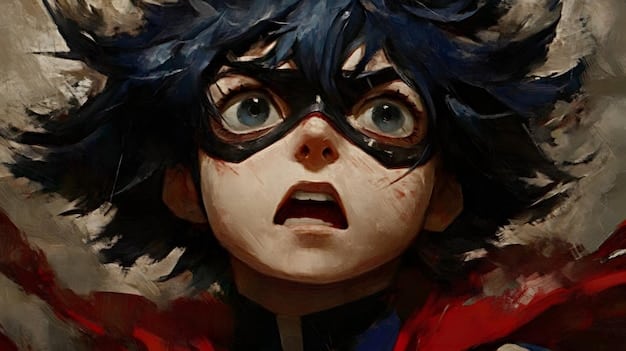
Examples of Moral Ambiguity in Shonen Manga
Series like “My Hero Academia” and “Code Geass” explore the blurred lines between hero and villain, forcing characters to confront their ideals.
- “My Hero Academia”: Discusses the burden of heroism and the sacrifices that must be made for the greater good from the protagonist’s perspective.
- “Code Geass”: Follows Lelouch’s morally questionable actions as he fights for freedom, blurring the distinction between justice and tyranny.
- “Death Note”: Explores how moral ambiguity can change the protagonist and the audience’s own perspectives on justice in a dark but thought provoking way.
By diving into these complexities, shonen manga prompts viewers to assess their values and empathize with characters even when they make questionable choices, deepening the impact. In this way, shonen anime can be thought provoking and morally compelling.
The Impact on Modern Audiences
Modern shonen manga’s focus on emotions deeply connects with audiences, who appreciate the authenticity and relatable themes. By exploring complex issues, shonen manga speaks to the modern world.
The enhanced emotional depth makes these stories more impactful and enduring, resonating with fans on a profound level, creating a lasting impression that goes beyond the page.
Why Emotional Depth Matters
Emotional storytelling provides viewers with characters they can truly care about, intensifying the impact of narrative events.
This connection encourages viewers to invest more deeply in the series and reflect on the themes explored.
Examples of Audience Engagement
The success of series like “Violet Evergarden” and “A Silent Voice” demonstrates the audience’s appetite for poignant and emotionally resonant stories.
- “Violet Evergarden”: Explores themes of emotion, connection, and healing, which are all elements of the human experience.
- “A Silent Voice”: Addresses the impact of bullying and the importance of forgiveness and reconciliation.
The rising popularity in shonen manga with rich characters and complex story lines proves how audiences appreciate when a story includes both action and deeper character development to connect with the target.
The Future of Emotional Shonen Manga
The future of shonen manga is bright, with ongoing experimentation and innovation in emotional storytelling. As creators continue to push the boundaries, audiences can expect even richer, more impactful narratives.
This direction promises to expand the genre’s appeal and cement its place as a powerful medium for emotional exploration and personal growth.
Trends to Watch For
Anticipate more diverse representation, nuanced explorations of mental health, and greater collaboration across genres.
These trends promise to keep the world of shonen manga fresh, relevant, and deeply moving.
The Evolution of the Genre
Expect continued evolution that integrates emotional depth more seamlessly into traditional shonen elements, creating a harmonious blend of action and introspection.
- Diverse Representation: Expect characters from all walks of life that speak to the common struggles that everyone faces on a daily basis.
- Mental Health Awareness: Series that deal with depression, anxiety, and other mental health issues, which can offer insight, relief, and relatability to a larger scale audience.
As shonen manga continues to evolve, it will remain a vital source of entertainment, reflection, and emotional connection for audiences worldwide.
| Key Point | Brief Description |
|---|---|
| 💪 Character Complexity | Modern shonen explores internal struggles rather than simple archetypes. |
| 🤝 Nuanced Friendship | Friendships are vital to character growth and overcoming challenges. |
| 💔 Addressing Loss | Shonen explores grief and its transformative power on characters. |
| ⚖️ Moral Dilemmas | Characters confront ethical choices, blurring lines between good and evil. |
Frequently Asked Questions
▼
Modern shonen manga emphasizes character development and emotional depth, going beyond simple action narratives. Story lines are more nuanced and relate to larger audiences.
▼
Friendship is more than just a plot device; it’s vital for providing emotional support and driving character development. Friendships evolve alongside the characters’ struggles.
▼
Themes of loss and grief add depth to the narratives, allowing characters to grapple with personal vulnerabilities and discover inner resilience after tragic events occur.
▼
Shonen manga presents characters with ethical dilemmas, challenging audiences to consider different perspectives and think critically about the decisions that the characters make.
▼
Modern shonen manga resonates with audiences through authenticity and relatable themes. The enhanced emotional depth makes these stories more impactful and enduring for the fans.
Conclusion
The evolution of shonen manga towards greater emotional depth is transforming the genre. By focusing on complex characters, nuanced relationships, and profound themes, modern series offer compelling narratives that captivate and resonate with audiences, making shonen manga a powerful medium for emotional storytelling.
